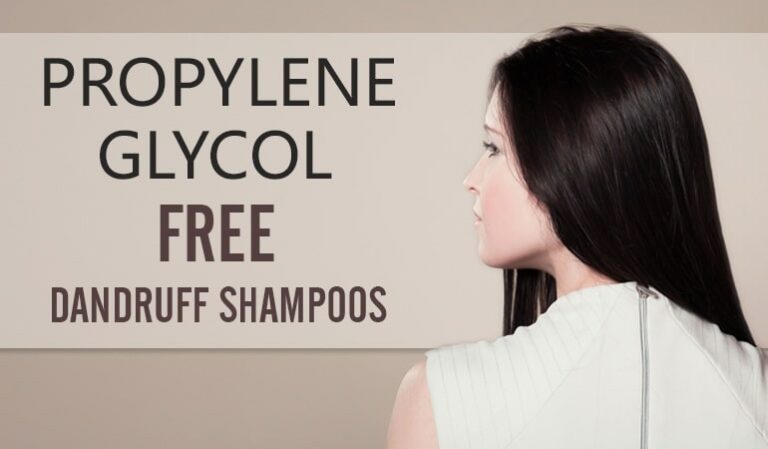Dandruff Deconstructed is reader-supported. All reviews are independent and any products reviewed are purchased by the site owner. To help fund this model, some of the links on the site are affiliate links. If you decide to make a purchase from one of these links, this site will receive some commission. At no cost to you. It helps keeps this place running. Learn more
Propylene Glycol is a chemical commonly added to shampoos that as built quite the reputation.
Yes, it’s also used in anti-freeze, but is the reputation deserved?
In this article, in typical Dandruff Deconstructed fashion we’ll take an evidence-based approach to evaluate the science and risks of humectants in shampoos, and review the alternatives for those with sensitivities.
What is Propylene Glycol?
Propylene glycol, or ‘propane-1,2-diol’, is a synthetic alcohol used as a ‘humectant’ in shampoos. It has a range of uses outside of cosmetics, commonly found in products manufactured by the chemical, food, and pharmaceutical industries. Interestingly, propylene glycol has freezing point below water – approximately -60°C – and so can be used in antifreeze products [1].
Propylene glycol is synthesised as a by-product in petroleum and natural gas refineries. The chemical process is complex, although generally involves high temperatures (over 150°C), and catalysts to speed up different steps of the reaction, including: benzene, 4-toluenesulfonyl chloride, nickel, and sulfuric acid [2].
[Note: propylene glycol is so commonly used that over 900,000 tonnes are made each year]
What are Humectants?
Humectants such as propylene glycol strongly attract water, due to molecular –hydroxyl groups. This means that they can ‘lock in’ water molecules, helping to moisturise the scalp and hair follicles. Humectants are important in shampoos, because they help to counteract harsher ingredients like surfactants and alcohols [3].
Propylene glycol is one of the most common humectants, but others to look out for include:
* tripropylene glycol
* triethylene glycol
* polypropylene glycol
* glycerin
Many shampoos will use a combination of these humectants, depending on the concentrations of surfactants and drying ingredients. If a shampoo claims to be ‘moisturising’, you’ll almost certainly be able to find at least one of the above on the ingredient label.
What are the risks?
Propylene glycol helps to moisturise the scalp and hair follicles, but it is also associated with a number of adverse effects. A number of studies have evaluated the risks from everyday use, and research has also started to evaluate the environmental impact.
1. Risks to humans
Propylene glycol is relatively non-irritating and well-tolerated, even at high concentrations. Studies have found increases of up to 180% in the risk of respiratory irritation, eczema, and asthma, although the results are generally inconsistent and suffer from poor methodologies [4,5]. It appears as if the highest risks are with paint and cleaning products, due to long exposure times – this is less of a concern with shampoos that are quickly washed away.
While propylene glycol is generally considered a low toxicity ingredient, it can cause severe contact dermatitis in some individuals. It’s not clear what makes some people more susceptible, but those with other skin conditions such as eczema seem to be at the highest risk. [6].
Note : Seborrheic Dermatitis is a form of eczema, so sufferers of seb derm should in particular be aware of this ingredient.
2. Risks to the environmental
Propylene glycol is biodegradable within 24-50 hours of exposure, but the process requires large quantities of oxygen. Concern has been raised about the impact of this oxygen consumption on aquatic animals, possibly altering biodiversity profiles – although the impact is still being researched. Outside of this concern, the breakdown products of propylene glycol are known to not bioaccumulate or cause toxicity to aquatic life [7].
Are there any alternatives?
There are a number of ‘natural’ humectants, but they aren’t commonly used in shampoos because propylene glycol is generally well-tolerated and extremely low cost. These alternatives can be found on high street shelves, and offer those with diagnosed sensitivities a less irritating shampoo.
1. Hyaluronic acid
Hyaluronic acid is found throughout the human body, and plays a role in a number of physiological processes, including: building cartilage, joint protection, tissue repair, and cell adhesion. It’s a less irritating alternative to propylene glycol in shampoos, because as a much larger molecule it can’t be absorbed through the skin [8].
2. Glycerin
Glycerin is similar to propylene glycol in terms of molecular structure, but is derived from triglycerides found in plants or animals, instead of from the petrochemical industry. Glycerin is very well-tolerated, and is used a humectant substitute in many ‘sensitive skin’ products [9].
The Best Propylene Glycol Free Dandruff Shampoos

Pharmaceutical Specialities Free & Clear Shampoo
Designed to treat Seborrheic Dermatitis, Dry Scalp and Psoriasis
Pharmaceutical Specialties formed in 1974 to “start a company to make better products than were commercially available for people with sensitive skin”. And boy, have they achieved it with this Free and Clear shampoo.
What is perhaps surprising on a website dedicated to dandruff treatments is that this isn’t a dandruff shampoo at all.
It’s rather a "a non-medicated, mild shampoo for sensitive skin and scalp.”
That said, we can’t use a medicated shampoo all the time, and this is my go to shampoo for those “between” washes.
Read the entire review

BIOM8 Skin Conditioning Oil
Designed to treat Seborrheic Dermatitis, Dry Scalp
BIOM8 Skin Conditioning Oil is now part of my daily skin care routine. It’s as simple as that. I have lost count of the number of products I’ve reviewed over the years and I can count on one hand the number of products that have impacted me on this level.
If you suffer from dry skin, facial seb derm or rosacea I simply can’t recommend this product highly enough.
It even makes a good beard oil!
Read the entire review

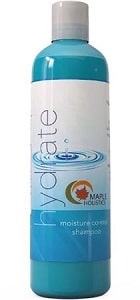
Maple Holistics Hydrate Shampoo
Designed to treat Dry Scalp
Maple Holistics Hydrate Shampoo has been superbly formulated to soothe and moisturize the scalp and hair. The ingredients have been carefully selected to decrease the chance that the product will irritate the skin. Using multiple low dose surfactants is a stroke of genius and only the fact the shampoo contains only one potential contact allergen says it all.
This is as close to perfection as you get in the commercial shampoo world.
I simply can't recommend this highly enough.
Read the entire review

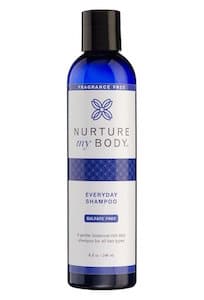
Nurture My Body Everyday Fragrance Free Shampoo
Designed to treat Dry Scalp
Nurture My Body Everyday Fragrance-Free Shampoo is an excellent gentle option for sufferers of a dry irritated scalp. The absence of any noteworthy irritants or allergens combined with the expert formulation of anti-inflammatory moisturizing ingredients makes an excellent change from the usual harsh surfactants and other toxins that lead to a vicious cycle of irritation and inflammation.
They've managed all of this in a shampoo that foams and washes well.
It's not particularly cheap, but this is simply one of the finest dry scalp shampoos out there.
Read the entire review

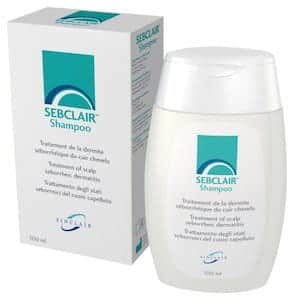
Sebclair Shampoo
Designed to treat Seborrheic Dermatitis, Dry Scalp
Calling all sensitive scalp sufferers, if you haven’t yet found an anti-dandruff shampoo your scalp can tolerate, you haven’t yet found Sebclair shampoo. A piroctone olamine, Malassezia yeast quelling formula with extremely mild yet highly effective cleansers, accompanying scalp hydrators, flake fighters and natural anti-inflammatories. No fragrance, no essentials oils, no allergens. Sebclair shampoo really does stand out in our anti-dandruff crowd.
Read the entire review

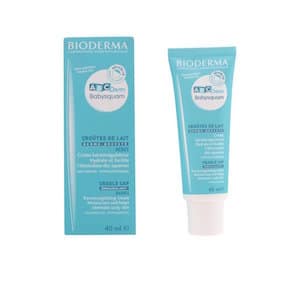
Bioderma ABCDerm Babysquam
Designed to treat Seborrheic Dermatitis and Cradle Cap
If your babe’s crusty cradle cap’s only getting worse, it’s time to try a leave on treatment – one which doesn’t leave your baby’s scalp looking like a grease ball. Enter Bioderma’s ABDderm Babysquam keratoregulating cream a 14 ingredient formula made from sensitive, hypoallergenic, moisturising, soothing and barrier building ingredients.
Useable 7 days a week with no fragrance or harsh preservatives Bioderma’s ABDderm Babysquam keratoregulating cream respects, repairs and conditions away crusty cradle cap.
Read the entire review

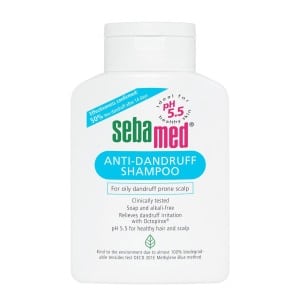
Sebamed Anti-Dandruff Shampoo
Designed to treat Seborrheic Dermatitis
Sebamed is one of the gentle yet most effective seb derm shampoos available.
The active ingredient is Piroctine Olamine - an excellent anti-fungal agent.
The rest of the shampoo has been formulated with panache.
Read the entire review


DHS Fragrance Free Tar Shampoo
Designed to treat Seborrheic Dermatitis and Psoriasis
DHS Coal Tar Shampoo is an expertly formulated shampoo containing 0.5% coal tar and is the gentlest coal tar shampoo we’ve yet reviewed
We can't recommend this product or this company highly enough.
Read the entire review

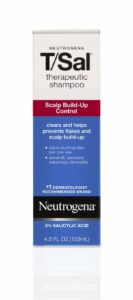
Neutrogena T/Sal Therapeutic Shampoo
Designed to treat Seborrheic Dermatitis and Psoriasis
Quite simply the best pure Salicylic Acid shampoo we’ve yet reviewed. The shampoo contains 3% Salicylic Acid combined with a fragrance free, sulfate free and virtually every other nasty ingredient free formulation. It does this and still feels luxurious when washing.
Neutrogena should be exceptionally proud of this top top class shampoo.
Read the entire review

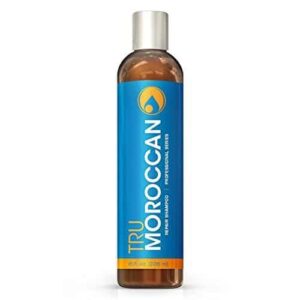
Tru Moroccan Repair Shampoo
Designed to treat Dry Scalp
An impressive dry scalp treatment shampoo with an innovative formulation.
I have to applaud any company that can formulate a shampoo with so few allergens. The fact that it washes so well is marvelous. For those not sensitive to Cocamidopropyl Betaine, Phenoxyethanol or fragrances - this is an excellent shampoo.
Read the entire review

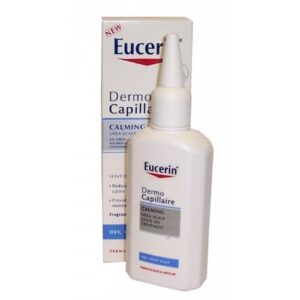
Eucerin Dermocapillaire Calming Urea Scalp Treatment [ebay affiliate link]
Designed to treat Dry Scalp
This dry scalp treatment isn’t a shampoo at all, but rather a leave on moisturizer that you apply to your hair after washing.
The advantage of this approach is that, while shampoos are designed to clean (and all the sensitizing issues that come with that) this treatment is designed to moisturize and nothing else.
You’re free to use the shampoo of your choice and us this treatment in combination.
It’s an excellent approach that I hope other manufacturers take notice of.
Read the entire review

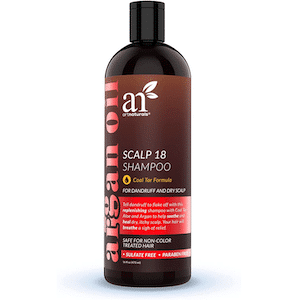
Scalp 18 Coal Tar Shampoo
Designed to treat Seborrheic Dermatitis and Psoriasis
Hydrating shampoo formulas don’t come around often making Art Naturals Scalp 18 Coal Tar Shampoo a gem. Best for dry, itchy scalp symptoms. Can be used for mild dandruff. Plant-based, sustainable and cruelty-free – an all-round goodie.
Read the entire review

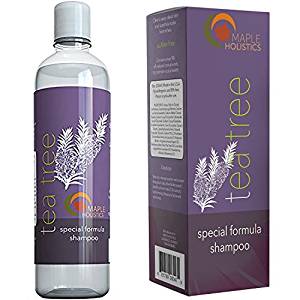
Maple Holistics Tea Tree Oil Shampoo
Designed to treat Seborrheic Dermatitis, Dry Scalp
Maple Holistics Tea Tree Shampoo is an outstanding Tea Tree shampoo for treating Dry Scalp or Seb Derm. It doesn’t contain any artificial coloring or fragrance, sulfates, parabens, or carcinogens. It contains only three potential contact allergens, with two of the three being tea tree and rosemary essential oils.
The combination of cleansing agents used are gentle, effective and innovative while the shampoo smells ace and washes even better.
If you're looking for a tea tree shampoo, I can't recommend this highly enough.
Read the entire review

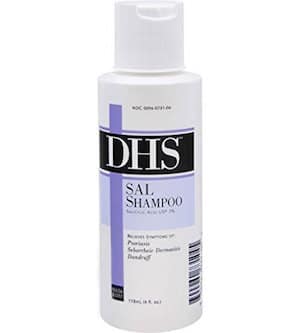
DHS Sal Dandruff Shampoo
Designed to treat Seborrheic Dermatitis and Psoriasis
DHS Sal Shampoo is a 3% salicylic acid shampoo designed to treat Psoriasis and Seborrheic Dermatitis.
It’s an outstanding shampoo that washes well, contains relatively few ingredients, is gentle and won’t break the bank.
If you’re not sensitive to sulfates and are looking for a good salicylic acid shampoo, this is an excellent performer.
Yet again, DHS have produced a shampoo that we can't recommend highly enough.
Read the entire review

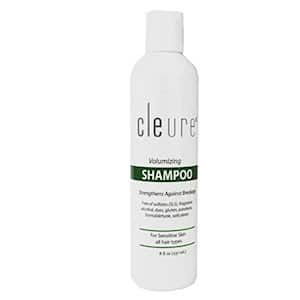
Cleure Volumizing Shampoo
Designed to treat Dry Scalp
Cleure Volumizing uses only a handful of skin conditioning agents and gentle cleansers to treat a dry scalp.
It contains only two potential irritants that should be considered low to moderate concerns, compared to other much harsher alternatives. This shampoo doesn’t use any sulfates, parabens, artificial fragrances, dyes, alcohol, salicylates, formaldehyde, or SLS, making it a good option for those with sensitive scalps who typically react to less gentle, conventional shampoo and other personal care products.
Unless you have severely sensitive skin and are highly reactive to any potential irritants, we suggest trying this shampoo from Cleure and seeing if it calms your sensitive skin, and helps to clear up any dryness and itchiness on your scalp.
Read the entire review

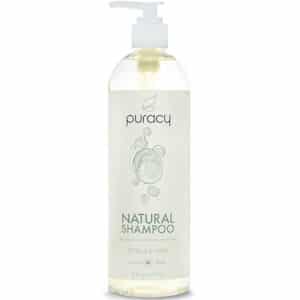
Puracy Natural Shampoo
Designed to treat Seborrheic Dermatitis, Dry Scalp and Psoriasis
Puracy Citrus Mint Natural Shampoo offers a great natural alternative to the many sulfate laden shampoos on the market today. Whether you are looking for an everyday use shampoo, or one that you can rotate your medicated dandruff shampoo with, we’d recommend trying the Natural Shampoo.
Because there are essential oils in the formula, we recommend caution to anyone who is sensitive to fragrances, or sensitive or allergic to any of the ingredients.
Otherwise, you’re looking at an expertly formulated shampoo that, for once, lives up to the manufacturer’s promises.
Read the entire review

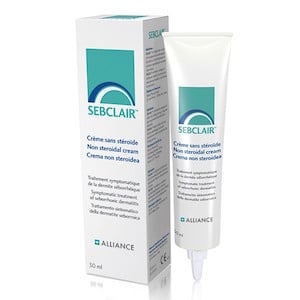
Sebclair Non-Steroidal Cream
Designed to treat Seborrheic Dermatitis, Dry Scalp
Sebclair Non-Steroidal Cream is an anti-fungal, piroctone olamine based treatment partnered with a trophy cabinet of natural anti-inflammatory actives. If you have a mild to moderate case of seb derm, hate steroids and love naturals Sebclair is for you. Best bit – there’s only two known allergens or irritants.
Read the entire review

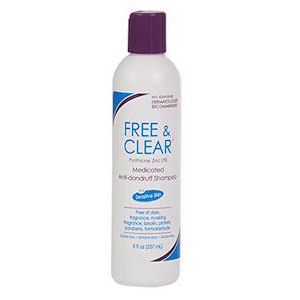
Free and Clear Medicated Anti-Dandruff Shampoo
Designed to treat Seborrheic Dermatitis
Do you have an extremely sensitive scalp in need of anti-dandruff help? Do you suffer from mild to moderate seb derm? Meet your new best friend. Free & Clear’s Medicated Anti-Dandruff Shampoo contains zero allergens, zero irritants, zero sensitizers formula based on 2% zinc pyrithione. An active ingredient able to improve the health of dandruff affected skin while also helping pacify dandruff causing overgrowths of the Malassezia yeast.
I simply can't recommend this shampoo highly enough.
Read the entire review

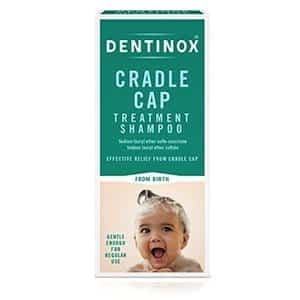
Dentinox Cradle Cap Baby Shampoo
Designed to treat Seborrheic Dermatitis and Cradle Cap
Did you know using natural oils could be making your baby’s cradle cap last for longer? Instead, we recommend placing your trust in clinically trialed baby-friendly formulas able to effectively tackle the cause of your baby’s cradle cap – excess scalp oil. Case and point, ultra-mild Dentinox Cradle Cap Treatment Shampoo, an 8 ingredient formula proven safe and effective for everyday use.
Read the entire review

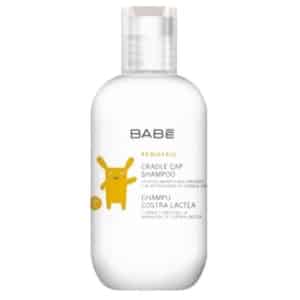
Babe Laboratorios Paediatric Cradle Cap Shampoo
Designed to treat Seborrheic Dermatitis and Cradle Cap
Tired of testing out cradle cap shampoos which just don’t budge your babe’s crusty dry scalp? Then you need a cradle cap shampoo with active ingredients proven to work. Enter Babe Laboratorios Paediatric Cradle Cap Shampoo a 4 active ingredient formula including 0.5% scalp softening salicylic acid plus a boosting active able to make your 0.5% dose work harder than its quantity would usually dictate. For use 2 to 3 times a week, the gentle shampoo formula cleanses carefully, treats sensitively and works simply.
Read the entire review

References
[1] Dasari, M. A., Kiatsimkul, P. P., Sutterlin, W. R., & Suppes, G. J. (2005). Low-pressure hydrogenolysis of glycerol to propylene glycol. Applied Catalysis A: General, 281(1), 225-231.
[2] Brissault, B., Guis, C., & Cheradame, H. (2005). New highly functionalized primary allyl, hydroxyl, and tosyl poly (propylene glycol) s (PPG) from available PPG derivatization. Macromolecules, 38(20), 8244-8251.
[3] Lowther, A., McCormick, T., & Nedorost, S. (2008). Systemic contact dermatitis from propylene glycol. Dermatitis, 19(2), 105-108.
[4] Choi, H., Schmidbauer, N., Sundell, J., Hasselgren, M., Spengler, J., & Bornehag, C. G. (2010). Common household chemicals and the allergy risks in pre-school age children. PLoS One, 5(10), e13423.
[5] Dockrell, M., Morison, R., Bauld, L., & McNeill, A. (2013). E-cigarettes: prevalence and attitudes in Great Britain. Nicotine & Tobacco Research, ntt057.
[6] Lessmann, H., Schnuch, A., Geier, J., & Uter, W. (2005). Skin‐sensitizing and irritant properties of propylene glycol. Contact Dermatitis, 53(5), 247-259.
[7] Ramakrishna, D. M., & Viraraghavan, T. (2005). Environmental impact of chemical deicers–a review. Water, Air, and Soil Pollution, 166(1-4), 49-63.
[8] Kraft, J. N., & Lynde, C. W. (2005). Moisturizers: what they are and a practical approach to product selection. Skin Therapy Lett, 10(5), 1-8.
[9] Rawlings, A. V., Canestrari, D. A., & Dobkowski, B. (2004). Moisturizer technology versus clinical performance. Dermatologic Therapy, 17(s1), 49-56.
